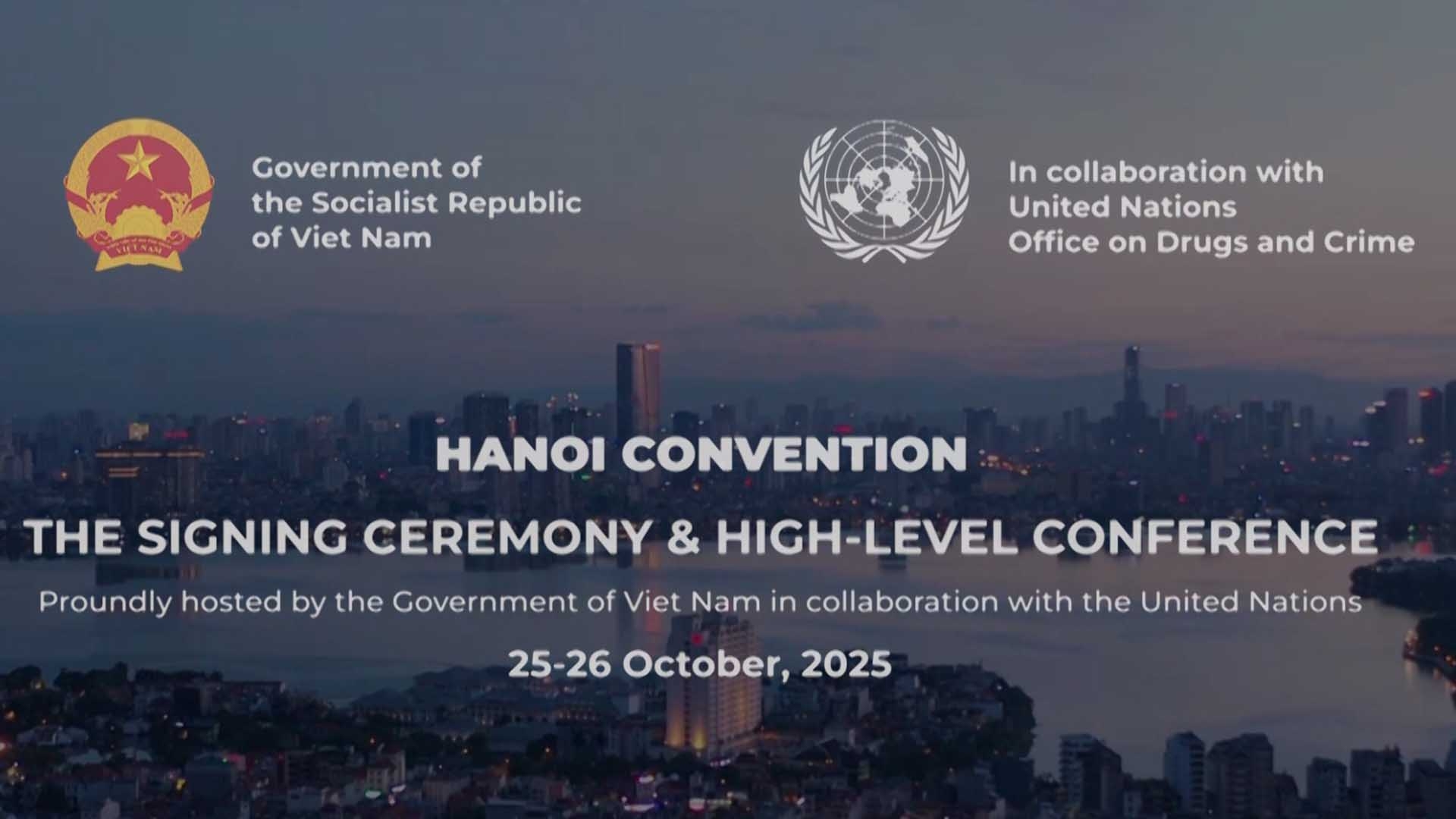
Decoding American Media Crisis: A Different Perspective
Latest
| TIN LIÊN QUAN | |
| Foreign media lauds Vietnam’s economic growth | |
| Foreign media consider APEC 2017 diplomatic success of Vietnam | |
 |
| Nguyen Quang Dy |
It is an exceptional paradox that would make America attractive and strong. The First Amendment on the freedom of speech is a key pillar for the power of the US as a nation, but now being challenged by Trump. For many people, it is quite difficult to make sure when a communication crisis is turning into a political crisis or constitutional crisis. Perhaps, the ghost of Watergate never dies, and the 25th Amendment is the only available deterrence to any president who is not following the rules of the game. That is a typical paradox of the political system that makes America so exceptional, yet so vulnerable to crises.
Communication bombshells
Last week, there were two major communication events exploding like bombshells shaking the Trump administration, while Robert Mueller’s investigation seems like the Damocles Sword hanging over Trump. First, the anonymous op-ed in the New York Times (August 5, 2018) reportedly penned by “a senior administration official” is like a bushfire raging in Washington. While leaking may be a common game in the White House, this dramatic event is giving White House officials a big headache as they try to put out this bushfire. As senior White House officials denied it (that “it wasn’t me”), Trump has asked the Attorney General to investigate, but after one week nobody has been identified as the one (who did it).
The second event was a new book by senior journalist Bob Woodward (“Fear: Trump in the Whitehouse”, Simon & Schuster, September 11, 2018) as a communication bombshell just exploding. The book was announced only one day after the anonymous op-ed in the New York Times. The coincidence in the timing and content of the story has made this fire and bomb much more damaging for Trump (as the mid-term election is coming soon). Not long ago, two other communication events also touched on some nerves in Washington. It was a book by journalist Michael Wolff (“Fire and Fury”, Holt, January 5, 2018), and another by (fired) White House assistant Omarosa Manigault (“Unhinged: An Insider's Account of the Trump White House”, Simon & Schuster, August 14, 2018). But compared with these communication events, the Woodward bombshell is much more devastating (as a “blockbuster”).
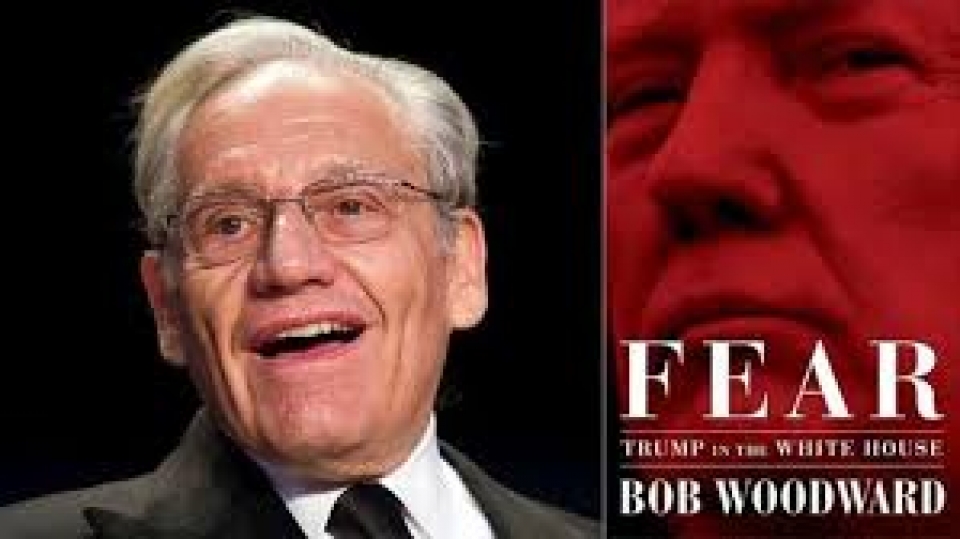 |
| Bob Woodward and his book “Fear: Trump in the Whitehouse”. |
Bob Woodward (a veteran journalist from The Washington Post) is not just another author, but a big name in American journalism that most presidents knew (though reluctant to associate). Woodward is the author of 18 books written about American presidents since Richard Nixon (and the Watergate drama), among them 12 were number one national best sellers. Woodward won two Pulitzers (that few other journalists could). He was known not only for writing big stories, but also for his reputation and credibility, as he was meticulous about sources to be quoted. In this new book (Fear), Woodward has resorted to “deep background”.
While it is still too early to gauge the impact of these events, it seems the US is undergoing a major communication crisis, associated with a profound political crisis, touching on basic values of political institutions. Perhaps, this is a global problem (not just in the US) but it gets more exposure there. As the basic values of liberal democracy and freedom of speech are challenged, Trump seems so hostile to the news media that he often called “fake news” and called journalists “enemy of the people”. Not only freedom of speech but also identity politics is attacked, leading to the rise of neo-conservatism, excessive nationalism and populism.
The Divided States of America
In that context, the up-coming mid-term election (in November 2018) is significant. First, it would redefine the mood and attitude of American voters as many of them had voted for Trump nearly two years ago, and refocus on the political trend in the next two years when voters are supposed to choose their next president again. Second, it would reset the political balance between the Republican and Democratic parties in Congress. Trump may be in trouble in a new political and constitutional crisis if the Democrats gets the majority, and if Robert Mueller’s investigation confirms Trump’s collusion with the Russians during the 2016 campaign, leading to possible impeachment process (according to the 25th Amendment).
On August 16, 2018, 343 news media outlets across America responded to the Boston Globe’s call to run editorials protesting Trump’s “dirty war” against press freedom. While many news organizations joined this effort, including some major newspapers like the New York Times, many others did not participate, including the Wall Street Journal. Not only America is divided but also the news media is polarized. Perhaps, this is an unintended consequence of the 2016 presidential election which has been seen as one of the most divisive political events in electoral history, ironically leading to “the Divided States of America”.
In an editorial headlined “A Free Press Needs you”, the New York Times wrote that calling the truth you don’t like as “fake news”, is “dangerous to the lifeblood of democracy”, and calling journalists as “enemy of the people” is dangerous to them. During a private meeting with Trump (in July 2018), AG. Sulzberger (owner of the New York Times) said that the President’s words are “contributing to the rise of threats to journalists, and leading to violence”. While Trump is well known for his big ego and lies, he often used dirty words (as “lowlife” and “dog”) to insult people he did not like, including women (as Omarosa Manigault).
According to a public opinion poll conducted by Quinnipiac University, “51% of Republican voters believed the news media was the “enemy of the people”, while 65% of voters in general believed the press was an important part of democracy. Another survey this month also came up with similar results that 48% of Republican voters agreed that the news media was the “enemy of the American people”, with 28% disagreeing. And 23% of Republican supporters (and about 1/8 of Americans in general) believed Trump should close down such mainstream news media as the CNN, the Washington Post, and the New York Times, etc…
Changing mindset and paradigm
Those are some quick (and critical) review of the broad picture of domestic politics, while the picture of Trump’s economics and international politics seem better and positive, especially the prospects of the Sino-US trade war now in the second phase (since September 6, 2018). Trump’s record of achievements in international relations (with North Korea, for example) cannot be denied. Among living US Presidents, only Trump could stand up to China. But these facts could easily be colored and distorted by negative images at home. These contrasts could be easily confused, like the unusual and unpredictable character of Trump.
That is why it is difficult to assess Trump (on face values) as it could easily be confused. Recently, assessments of Trump have been polarized to some extremes (like blind men describing an elephant). Some would criticize Trump so severely, despite his obvious achievements, while others would praise him so much, despite his obvious follies. Not only Trump (or Trumpism) is at fault, but also those who support or oppose him may be mistaken in a world based not only on truth but also on half-truth or “post-truth”.
For better understanding and explanation of those political changes in the US and the rest of the world with hidden factors and changing variables (like climate change going on right now), people should change their mindset and paradigm. If they want to join the new world of 4.0 technologies, they can not hold on to the old world of 0.4 permanent ideologies. They would get trapped in the status quo mindset (like prisoners of the past), and get lost in the matrix of the new world order (or disorder) that is yet to be defined, and further confused. Not only the US and world order is in turmoil, but also the human mind is in crisis.
Nguyen Quang Dy
* The article reflects the opinion of Nguyen Quang Dy and does not necessarily represent the viewpoint of The World and Vietnam Report.
| Author Nguyen Quang Dy graduated from the Diplomatic University of Vietnam (now the Diplomatic Academy of Vietnam) in 1971, then worked at the Ministry of Foreign Affairs from 1971 to 2005. He was also trained at the Australian National University (1976-1979) and Harvard University (Nieman Fellow, 1992-1993). Dy is an expert in international studies, journalism and communication, education. For a long period, he had been the senior advisor to several Vietnamese and international organizations as well as training programs. Currently, Nguyen Quang Dy is a freelance writer and independent researcher/consultant. |
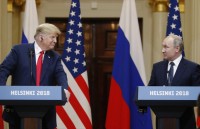 | Vietnam hails Trump-Putin meeting The summit between US President Donald Trump and his Russian counterpart Vladimir Putin took place on July 16. |
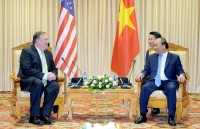 | PM hopes for stronger Vietnam-US ties Prime Minister Nguyen Xuan Phuc affirmed that Vietnam attaches importance to its relations with the US at a reception for US Secretary of State Mike ... |
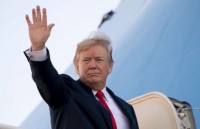 | US President Trump to pay State visit to Vietnam US President Donald Trump will pay a State visit to Vietnam from November 11-12, announced the Ministry of Foreign Affairs on November 6. |









